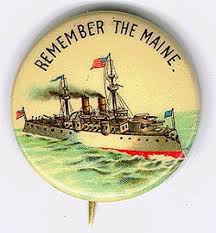Once again, we're going to use the power of hindsight to reevaluate the "official story" of the Spanish American War as published by the Hearst family of newspapers, and then our official, practically state-owned textbooks. Mining information from
this post by Richard Sanders via Lew Rockwell, we shall safely nestle this war in its appropriate context. The year is, of course 1898, and the robber barons, having successfully conquered the continental US, look for ways to expand their horizons.
 |
| Propaganda button |
CONTEXT Cubans fought several wars to free themselves from Spanish colonial rule, including 1868-1878, 1879-1880 and 1895-1898.12 In 1898, Cubans were on the brink of finally winning their independence. The US government agreed to respect Cuba’s sovereignty and promised they would not step in.
"On January 24, [1898] on the pretext of protecting the life and safety of Mr. Lee, U.S. consul in Havana, and other U.S. citizens in the face of street disturbances provoked by Spanish extremists, the Maine battleship entered the bay of Havana.”13
Sovereignty is a good thing, no? I thought that the American Way was limited and local, accountable government for all. Ok, now for some critical thinking skills: how is a battleship going to stop "street disturbances"? Are the sailors or Marines going to pile off the boat and look for hoodlums and "suspected terrorists"? How about just giving the U.S. citizens a gun to put in their belt?
PRETEXT On February 15, 1898, a huge explosion sank the USS Maine killing 266 of its crew.14In 1975, an investigation led by US Admiral Hyman Rickover concluded that there was no evidence of any external explosion. The explosion was internal, probably caused by a coal dust explosion. Oddly, the ship's weapons and explosives were stored next to the coal bunker.15
Anytime there is a change in basic operating procedures, a red flag should immediately go up.
RESPONSE The Maine’s commander cautioned against assumptions of an enemy attack. The press denounced him for "refusing to see the obvious." The Atlantic Monthly said anyone thinking this was not a premeditated, Spanish act of war was "completely at defiance of the laws of probability."16Newspapers ran wild headlines like: “Spanish Cannibalism,” “Inhuman Torture,” “Amazon Warriors Fight For Rebels.”17 Guillermo Jimpnez Soler notes: “As would become its usual practice, U.S. intervention in the war was preceded by intensive press campaigns which incited jingoism, pandering to the most shameless tales and sensationalism and exacerbated cheap sentimentality. Joseph Pulitzer of The World and William Randolph Hearst from The Journal, the two largest U.S. papers... carried their rivalry to a paroxysm of inflaming public opinion with scandalous, provocative and imaginary stories designed to win acceptance of U.S. participation in the first of its holy wars beyond its maritime borders.”18
US papers sent hundreds of reporters and photographers to cover the apparent Spanish attacks. Upon arrival, many were disappointed. Frederick Remington wrote to Hearst saying: “There is no war .... Request to be recalled.” Hearst’s now-famous cable replied: "Please remain. You furnish the pictures, I'll furnish the war." For weeks, The Journal dedicated more than eight pages per day to the explosion. 19Through ceaseless repetition, a rallying cry for retaliation grew into a roar. “In the papers, on the streets and in…Congress. The slogan was "Remember the Maine! To hell with Spain."20With the US public and government safely onboard, the US set sail for war launching an era of ‘gunboat diplomacy.’ Anti-war sentiments were drowned out by the sea of cries for war. On April 25, 1898, the US Congress declared war on Spain.
Once again, the real experts, the military man on site of the incident was shouted down by the bankster controlled media. There was money to be made and resources to be usurped through the police power of the State, and paid for by the American taxpayer.
REAL REASONS Within four months “the US replaced Spain as the colonial power in the Philippines, Guam and Puerto Rico, and devised a special status for Cuba. Never again would the US achieve so much…as in that ‘splendid little war,’ as…described at the time by John Hay, future secretary of state.”21Historian Howard Zinn has said that 1898 heralded “the most dramatic entrance onto the world scene of American military and economic power.… The war ushered in what Henry Luce later referred to as the American Century, which really meant a century of American domination.”22
Now some of you might think me less patriotic for not jumping up and down for American domination, but I would call it bankster domination. They are using our nation as a host animal from which to spread their evil. Conservatives jump up and down and yell American Exceptionalism,
which is a term coined by a communist, for the purpose of spreading the communist/collectivist system. With the Spanish American War, the Elites moved their battleships out onto the board. They are still in Guam, Puerto Rico, Cuba, and the Philippines. Some might argue that some of these countries are better off, but the ends don't justify the means for a country that claims to be Christian and righteous. It was because Philippine War of 1905 that
Mark Twain penned the War Prayer:
Note: Twain wrote The War Prayer during the US war on the Philippines. It was submitted for publication, but on March 22, 1905, Harper's Bazaar rejected it as "not quite suited to a woman's magazine." Eight days later, Twain wrote to his friend Dan Beard, to whom he had read the story, "I don't think the prayer will be published in my time. None but the dead are permitted to tell the truth." Because he had an exclusive contract with Harper & Brothers, Mark Twain could not publish "The War Prayer" elsewhere and it remained unpublished until 1923.
No comments:
Post a Comment